#Treatment Analysis
Text

Navigating the Pneumonia Landscape: A Market Entry Guide | DLI
Pneumonia Disease Overview:
Pneumonia Disease is a prevalent respiratory infection characterized by inflammation in the air sacs of the lungs. It can be caused by various pathogens, including bacteria, viruses, and fungi. Pneumonia poses a significant global health burden, particularly affecting vulnerable populations such as the elderly, children, and individuals with compromised immune systems.
Given the global nature of healthcare, some diseases have a substantial effect on people's health and well-being. Pneumonia is a dangerous respiratory illness that affects millions of individuals worldwide and causes challenges for healthcare practitioners as well as businesses. Nevertheless, there are still untapped potential for growth and innovation in spite of these obstacles.
The Market Competitors Listed Below are Revolutionizing Healthcare with Innovative Diagnostic Inventions:
The leading amoxicillin market players:
Pfizer Inc
Novartis
Abbott laboratories
Endo International plc
Others
Price & Market Access
Diagnostic Analysis:
Accurate and timely diagnosis of pneumonia is crucial for effective treatment. Traditional diagnostic methods like chest X-rays and physical examinations remain fundamental. However, emerging techniques such as molecular diagnostics, PCR assays, and advanced imaging technologies have significantly improved accuracy and speed in identifying the causative agents.
Treatment Analysis:
Treatment of pneumonia depends on the underlying cause and severity. Antibiotics are commonly prescribed for bacterial pneumonia, while antiviral medications are used for viral infections. Supportive care, including oxygen therapy and intravenous fluids, may also be necessary.
Merger & Acquisition Advisory
Sputum Culture:
Sputum culture is a critical diagnostic tool in identifying the specific pathogens responsible for bacterial pneumonia. This method involves collecting a sample of respiratory secretions and culturing it in a laboratory to identify the causative bacteria and determine the most effective antibiotics for treatment.
How These Emerging Techniques Will Help in Market Growth:
The integration of emerging diagnostic techniques, such as rapid molecular assays and advanced imaging, promises a paradigm shift in pneumonia management. These techniques offer faster and more precise diagnoses, enabling healthcare providers to administer targeted treatments promptly. This improved efficiency is likely to drive market growth, as stakeholders recognize the value of these innovations in improving patient outcomes.
Regulatory Framework:
The regulatory landscape for pneumonia diagnostics and treatments is dynamic and varies by region. Health authorities worldwide are continuously updating guidelines and standards to accommodate emerging technologies and ensure patient safety. Adherence to these regulatory frameworks is essential for market entry and sustained growth.
Browse More Information:
Clinical Assessment:
Clinical assessment remains a cornerstone in pneumonia diagnosis and treatment. It involves a thorough evaluation of symptoms, physical examination, and medical history. Emerging technologies complement clinical assessment by providing objective data and enhancing the accuracy of diagnoses.
Market Trends Analysis:
The pneumonia diagnostics and treatment market is experiencing a transformative phase driven by technological advancements. The shift towards point-of-care testing, the development of multiplex assays, and the integration of artificial intelligence in imaging are notable trends. Additionally, there is a growing emphasis on personalized treatment approaches based on pathogen identification and antibiotic susceptibility testing.
Regional Insights:
Pneumonia prevalence and healthcare infrastructure vary by region. High-income countries often have more advanced diagnostic and treatment options, while low- and middle-income regions face challenges in accessing these resources. Market penetration and adoption of emerging techniques are influenced by economic factors, regulatory environments, and the availability of healthcare resources.
Conclusion:
Emerging diagnostic techniques are revolutionizing the management of pneumonia, offering faster and more accurate diagnoses. These advancements, coupled with evolving market trends and regulatory frameworks, are poised to drive substantial growth in the pneumonia diagnostics and treatment market. By embracing these innovations, healthcare providers can enhance patient outcomes and reduce the global burden of this prevalent respiratory infection.
Browse Through More Infectious Diseases Research Reports.
Related Reports:
Overcoming Obstacles by Presenting Hope in Lupus Disease Research
Diabetes Treatment Without Needles: Diagnostic Advances and Market Change
Manufacturing Barriers for Early Pancreatic Cancer Detection Kit Manufacturers: Understanding the Maze
Creating the Future of Pneumonia Treatment Options is boosting market growth.
A Game-Changer for the Management of Patients with Ovarian Cancer: Inhibitors of PARP
#clinical assessment#diagnostic analysis#market trends analysis#regnal insights#disease#treatment analysis#branding#economics#editorial design
0 notes
Text
Laios, Monsters, & Toshiro: On Racialized Desire and Identification with the Other
Arguably, the most significant part of Laios' character is the societal ostracization he faces because of his non-normative interests and behavior. For the majority of his life, Laios struggles socially, and other humans mistreat him. When he rescues Marcille from the Nightmares, his nightmare dredges up his inability to fit into school and the army. During his early dungeoneering days, he's lied to and exploited by his fellow party members.

One of his earliest and most formative negative experiences with people is his village's abuse of Falin as a magic user. He shares that after the villagers discovered that she can use magic, "adults who were just kind yesterday, all began to bully [her]." Instead of protecting Falin, his parent tell her to leave the village. The prejudice Falin faces and his parents' response to it upsets Laios to the point that he leaves home.

While Laios cares about his friends, the Demon points out that Laios understandably does not care for people in general. Laios doesn't disagree with the Demon's assessment and suspects that the Demon "can sense all [his] thoughts." The Demon goes on to say that Laios actually "despise[s] all humans." Laios denies this assessment, but given the Demon's uncanny ability to sniff out people's desires and Laios' ashamed expression, at least part of Laios likely agrees with the Demon. It's not a stretch to assume that he's held onto some hurt and resentment towards humans due to their mistreatment of him and Falin in their youth.

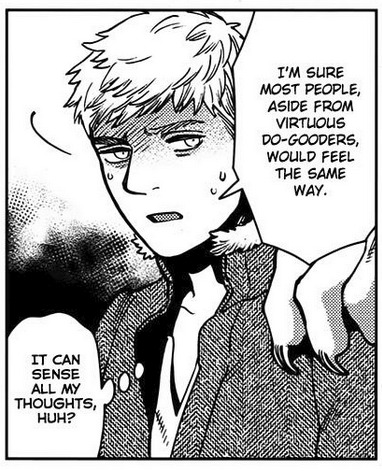
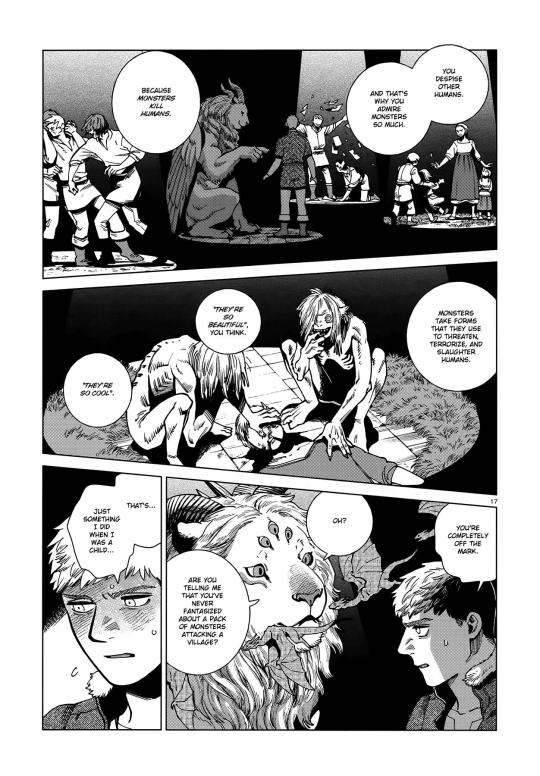
In response to how human society has othered him, Laios distances himself from humans and invests his time and energy into monsters and demi-humans instead. In the DunMeshi world, monsters and demi-humans are the ultimate societal Other. People fear them, exploit them, and even hunt and kill them. As someone who's similarly been mistreated by human society, Laios resonates deeply with monsters.
His desire to become a monster and/or beastman reflects his desire to reclaim agency over how society has ostracized him. If he chooses to become a monster, he gets to place value on what society has deemed despicable. He gets to choose why society hates him and be different on his own terms.
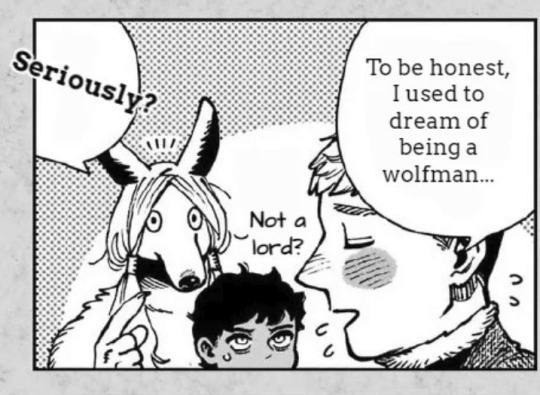
Both textually and thematically, Laios' identification with the Other bleeds into the erotic. More blatantly, he says that he'd have sex with orc women, and his succubus is a monstrous version of Marcille.


The entire story is also steeped in the theme of consumption as carnality. Laios and his party spend the entire manga eating monsters — a taboo physical act which they reap pleasure from; the underlying eroticism isn't difficult to see.
The story also presents consumption as a form of extreme identification. Eating a monster makes the monster part of you through digestion. The line between consuming the monster and becoming the monster — between erotic desire for the monster, demonstrated by eating their flesh, and identifying with the monster — is very blurred. Note that digesting a monster is an act of absorption; it destroys the original creature. Senshi states that consuming a monster erases "its individual identity," and major manga spoilers, but Laios defeats and pacifies the Demon by consuming its desire to eat. We'll come back to this concept later.
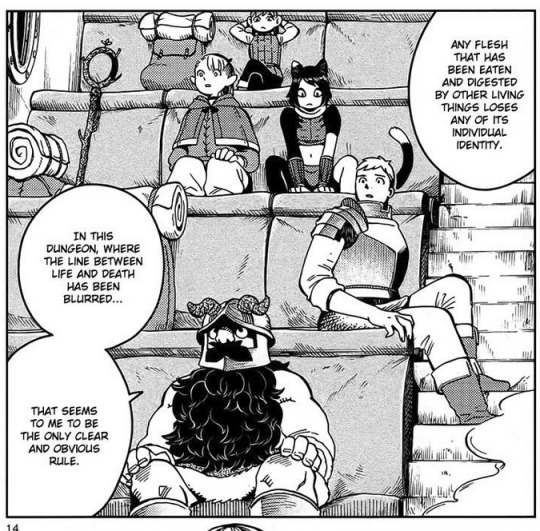
As previously mentioned, Laios is disinterested in most humans. The notable exception to this rule is Toshiro and by extension, the Eastern Archipelago. Laios doesn't seem to know much about the Archipelago before speaking to Toshiro, so he isn't drawn to Toshiro because he's an Easterner. Instead, he's drawn to his "odd appearance."
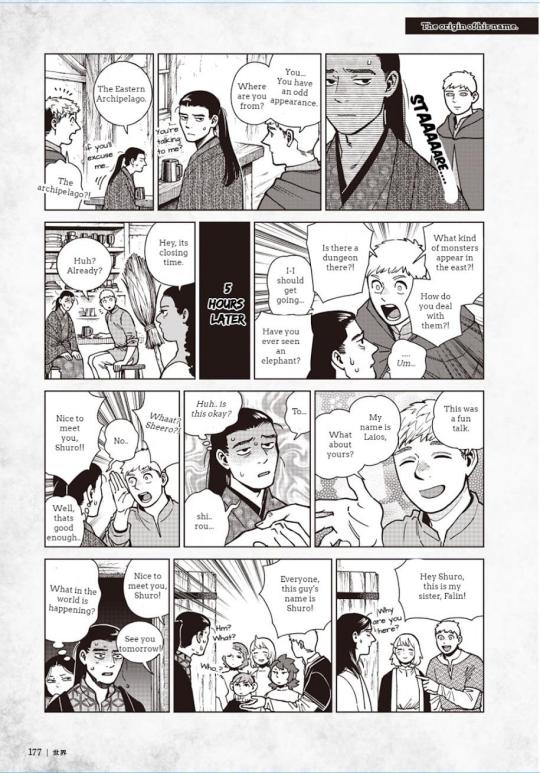
Just like Laios views monsters and demi-humans as a visible Other, Laios views Toshiro as another visible Other. On the Island, Toshiro stands out as a foreigner at first glance. While Laios as a white tallman doesn't appear visibly strange to other people, he's drawn again and again to people and creatures who are immediately visibly "odd." He sees them as understanding what it's like to be different and be mistreated for it, and since he relates to that experience, he wants to learn about them and be closer to them.
Essentially, Laios behaves towards Toshiro and his culture the same way he behaves towards monsters; he wants to know everything about Toshiro's foreign culture — the thing which makes him different. Unintentionally, Laios unintentionally reduces Toshiro to being Japanese; if he wasn't Japanese, Laios would never have approached him.
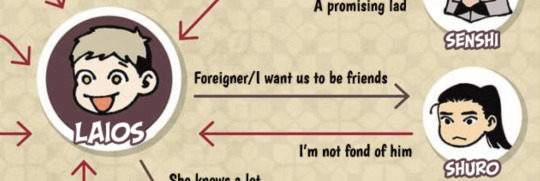
While Laios doesn't have bad intentions, as Toshiro himself acknowledges during their fight, his behavior towards Toshiro still has negative consequences. Laios' harmless interest in monsters translates to fetishization in the context of Japanese culture. He enacts multiple microaggressions against Toshiro and crossing his boundaries.
Laios goes beyond merely learning about Japanese culture. He takes parts of it for himself when he names his sword a Japanese name. Akin to his consumption of monsters, Laios attempts to participate in Toshiro's culture while failing to respect Toshiro himself. Just as eating monsters destroys them, Laios consuming Toshiro's culture while enacting racism against him causes real harm.
Many people have already written about Laios' microaggressions towards Toshiro, but a couple include Laios telling Toshiro that he looks "odd" and asking where he's from, mispronouncing his name as "Shuro," and assuming his favorite food is rice. Laios' treatment and fetishization of Toshiro is racist and harmful. However, I'd like to dive beyond the surface of Laios' micro-aggressive remarks and examine how his obsession with Toshiro becomes a racialized mode of desire, paralleling real world phenomena.
Though no concrete canonical evidence of Laios' feelings towards Toshiro being romantic and/or sexual exists, his interactions with Toshiro have erotic undertones. Their fight dialogue, in particular, revolves around eating, an act the story consistently shows as carnal. During this fight, Laios places his thumb in Toshiro's mouth and asks him, "What's the point of even having a mouth?" Laios' penetration of Toshiro's body via his mouth and his question's potential as an innuendo lend themselves to an erotic reading of the scene's more obvious conflict. Considering the overlap between consumption and carnality throughout the story, it's not a large jump to read eroticism into Laios demanding Toshiro meet his body's physical needs.

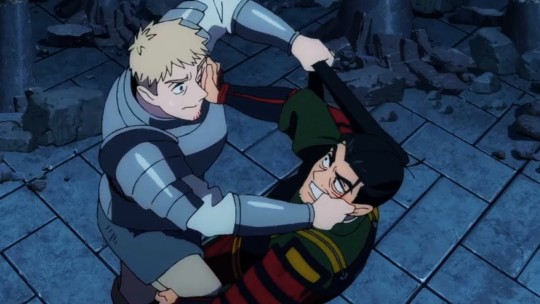
Furthermore, Laios is more enthusiastic about Toshiro than any other human in the series. While he cares deeply about his sister and his friends, Laios repeatedly expresses how much he admires Toshiro. He retains and brings up things like Toshiro's (perceived) favorite food. He wants to go to the East in Falin's place after she rejects Toshiro's marriage proposal, and in the "What-If" extra material, he's adamant about setting up a scenario where Toshiro travels with him through the Dungeon.

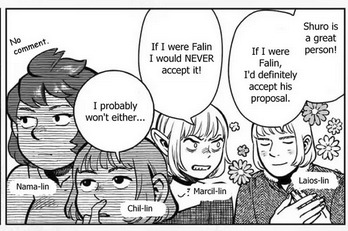

Undoubtedly, Laios is drawn to Toshiro. Since he sees non-white-ness and monstrosity as equivalent markers of societal othering, Toshiro's identity as a foreigner is what cultivates and maintains Laios' interest in him. Even if Laios learns to care for Toshiro as a person, his desire for Toshiro, platonically or otherwise, is still filtered heavily through race within the narrative.
Laios' relationship with his masculinity is also fraught. He broke off his engagement with a girl from his village and doesn't express normative interest in female tallmen. Seeing how the nightmare versions of his parents ask him when he's going to give them grandchildren, Laios experiences societal pressure to conform to a normative performance of masculinity through being attracted to and marrying a tallman woman and creating a family with her.
Laios frequently talks about how cool and admirable Toshiro is when he performs masculinity through combat, etc. He might find Toshiro's Asian masculinity more appealing and more accessible to him than the masculinity that's been forced onto him, precisely because Toshiro's Asian masculinity appears non-normative in a Western lens. But co-opting the masculinities of men of color as a white man would only further feed into the white consumption of cultures of color.
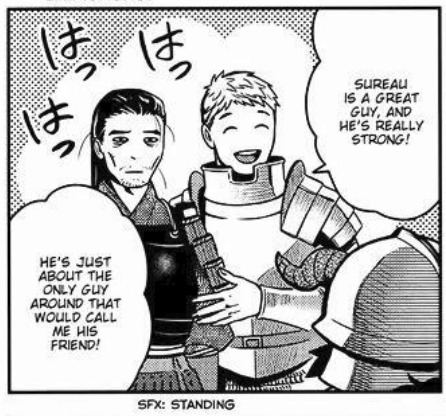
Overall, Laios' entitlement to and consumption of Toshiro's culture mirrors the real-life way white people co-opt and fetishize non-white cultures. Laios' fetishistic treatment of Japanese culture, because of his attraction (platonic or otherwise) to Toshiro, parallels white people's treatment of Asian people in the Western diaspora. I can only speak on the Asian American experience, but Laios immediately being drawn to Toshiro's "odd appearance," obsessing over his culture, and primarily treating Toshiro as a conduit for his said culture feels eerily close to how some white anime and/or K-pop fans act towards Japanese and Korean people.
Similarly to Laios, real queer, neurodivergent, and/or otherwise non-normative white people are marginalized by white Western society. They relate to how society others non-white cultures and/or people of color and latch onto them. While forming human connections based on curiosity and shared experiences is wonderful, white people are often unaware of the racial dynamics at play when they engage with non-white cultures and people of color and unintentionally, end up consuming and fetishizing non-white cultures in detrimental ways.
None of this negates the reality that Laios and Toshiro canonically care for each other. For instance, Toshiro's willingness to hug Laios reveals his genuine familiarity with and affection for him. The racial dynamics of their friendship complicate their relationship in fascinating ways and open up a potential path for Laios' growth. With time and effort, Laios could absolutely unlearn his racism and become a much better friend to Toshiro.
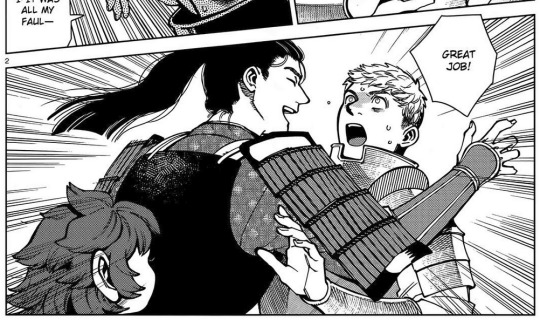
In conclusion, Laios' behavior towards Toshiro is a study in a marginalized white person's identification with and racialized desire for a non-white Other and how even a well-intentioned attempt at connection can replicate harmful racist dynamics. Toshiro's experience with Laios closely parallels real Asian people's struggles with racism and fetishization in our world today.
#laios touden#toshiro nakamoto#shuro#dungeon meshi#dunmeshi meta#dunmeshi analysis#i didn't want this to be superrr long but laios' treatment of the orcs is similar to his treatment of toshiro#he takes their cultural practices out of context and appropriates them (i.e. him wearing spoils of war when he declares himself king)#frankly him wanting to be an orc/wanting to sleep w orc women/appropriating their culture#and blurring the lines between identification/desire/consumption is even more clear than w toshiro#ryoko kui has a lot of interesting racial commentary in her work#but also she kinda flops on her depictions of black and brown ppl#anyw all very interesting to examine#i love u themes of consumption and desire and identity and borderline cannibalism#dunmeshi#delicious in dungeon#*mine#*meta
195 notes
·
View notes
Text
Why's it when Miles accidentally pulls half of Gwen's hair out it's funny cuz he didn't do it on purpose which is the truth but when she opens the packaging of his toy she should burn in hell even though she didn't get the idea why he kept it in the box and wouldn't do it if she knew what was the reason????
#i actually have a whole analysis in drafts about gwen's moment i didn't want to post it maybe i will one day cuz It's a perfect explanation#why do you keep attacking her and everything she does both scenes were made for laughs but it's just that girls get different treatment#gwen stacy#she deserves better#leave her alone#miles morales#spider man into the spider verse#spider man across the spider verse#into the spiderverse#across the spiderverse#spiderverse
576 notes
·
View notes
Text
Last Twilight: Ep 12
The TL;DR of this post is just... Sincerely what the fuck?
I remember posting after Episode 1 that I was keeping a suspicious eye on the mention of the eye donation because while I do think in real life disabled people have the right to manage their disability any way they want to and would support someone's choice to get a cornea transplant, real life is not fiction and fiction is designed to pull messages and themes from. Episode 12 from almost it's first moments completely undermines two and a half month's worth of messaging about learning to accept a new reality. I don't think it is foolish of me to assume based on the set up of the first episode that Last Twilight was supposed to be an exploration of grief as told in conversation and parallel between someone who lost a loved one and someone who lost their vision.
If this story had continued in the way it started out the first half of this show, I honestly think it could have been a 10, those first few episodes I was enjoying so much I was worried it might knock out Moonlight Chicken as my favorite Aof offering. Now I have rated Last Twilight as a 3, I will never suggest it to anyone and I will never rewatch it. Why?
Because from a fictional narrative perspective, having Day gain his vision back at the end undermines the entirety of the show's messaging from the first 11 episodes. Every single lesson, every single message just absolutely obliterated by every moment of Episode 12.
Day getting his vision back right as he and Mhok get back undermines the narrative in the following ways:
Rewarding Day for managing to create a successful and happy life as a blind person (literally like "hey you graduated and ran a bookstore while blind! Congrats you get to be normal again!)
"Rewarding" Mhok by insuring that he never has to do any caregiving for Day going forward so we don't get any navigating or expectation of Mhok and Day being in a longterm inter-abled relationship
We eliminate all chances that the subject of pitying Day re-enters any future fights, meaning there is now zero risk for Day maintaining a relationship with someone he worries might infantilize or pity him
It absolves Night of any remaining guilt he may be carrying from thinking he caused the accident that made Day blind
It absolves Day of any remaining anger at Night thinking he caused the accident that made Day blind
Mhon's ableist fucking ass gets her "normal" son back the way she confided in Mhok she'd hoped for after the first failed cornea transplant
It undermines the theme of the in universe Last Twilight novel and the conversation that Day and Mhok have about Mee being turned in to a statue on the top of the mountain and how that was hopeful because her father had found a sight so beautiful he couldn't think of anywhere else Mee would need to see and instead turns the message essentially in to: "there is hope, you can be cured"
It dismantles their cute couple thing of the one palm distance which also makes the OST that they played all the fucking time completely irrelevant
And most importantly, it undermines all the growth that Day went through while processing his grief and the two, TWO separate occasions where he came to terms with his disability
And that's just the disregard for the narrative messages, giving Day his eyesight back is incredibly ableist in the case of this story because of certain ableist through-lines woven in to the entire show. Namely:
While Day is blind, there is no reciprocity of care. Mhok is always taking care of Day, I cannot think of a single instance where Day really took care of Mhok in a significant way. By focusing so much on Day, and abandoning any strong focus on Mhok's grief over losing his sister, Day is never given an opportunity to be a support system for Mhok. Which is fucking ableist. Disabled people have so many things to offer the world, and while they might have specific support needs that does not mean that they can't offer support in return.
Mhok doesn't introduce Day to his family at their graves until after Day has his vision restored, and it is only then that Mhok says he has someone to take care of him. Able-ist!
Day gets his vision back almost immediately after a conversation with his mother where she says he wants to be normal and the fight he had with Mhok is normal.
Handling the entire story this way, with the break up, and a three year time gap, and then Day having his vision restored literally hours after he and Mhok get back together does not allow for any exploration of Mhok and Day having to figure out the differences between Mhok being his caretaker and Mhok being his partner.
We shunted literally every part of Mhok's backstory completely to the side, which in and of itself is fucking ableist in my opinion because it implies that able bodied people who are caretakers for or who are in a relationship with a disabled person don't have any time for themselves, to deal with their own shit or to have their own needs because they are too busy taking care of a disabled person.
With this being, what, the first main character in a BL with blindness, you want to go for the cure route after acceptance? Like you are rewarding someone for their bravery of handling their disability instead of allowing the disabled person to remain happy and thriving in the life they have built for themselves while they continue to be blind?
I'm not blind, so forgive me if I am overstepping at any point here but in my opinion, if you want a narrative that gives Day back his eyesight, that story that not be written by a sighted person. You need blind writers, people with the lived experience having control over the story so the narrative is better able to navigate the complexity of a decision like that, to reverse a character's blindness. I just think blind people would be able to minimize how much returning someone's eyesight might come off as ableist in a story like this. Additionally going the cure route is not a choice I think anyone should be making with the first BL that focuses this heavily on blindness. This world is so fucking ableist, if you want to make a story with a disabled main character with how slim of pickings there are, it feels much more responsible and subversive to go a disability pride route.
And these are just the issues around disability in this show, I have problems with the classism in this show, I have problems with the absolute ridiculousness of Mhok and Day's breakup and their reunion. MHOK APOLOGIZES, MHOK THANKS DAY FOR BREAKING UP WITH HIM, DAY DOES NOT APOLOGIZE FOR BREAKING UP WITH MHOK OR BLOCKING HIM ON SOCIALS FOR THREE YEARS BECAUSE MHOK PITIED DAY ONE (1) TIME. I get not wanting to be pitied, I get it, but seriously it is so much less compelling to have Day just completely abandon Mhok after all of the positive experiences they've had together because he messed up once rather than reel himself back in and have an adult conversation about what happened and try to get back to a balanced state.
Anyway, fuck this show. I am so disappointed that this is Aof's last directed piece for who knows how long. He could have gone out with a bang after Moonlight Chicken and now I am just fucking thankful I won't have to see anything else from him for awhile.
#last twilight#last twilight the series#let me reiterate that real life is different than fiction#disabled people have all the right in the world to handle their disability and any associated treatments however they want#this is fiction#and fiction reaches a wide audience and therefore has a responsibility in its messaging#last twilight meta#last twilight analysis
158 notes
·
View notes
Text




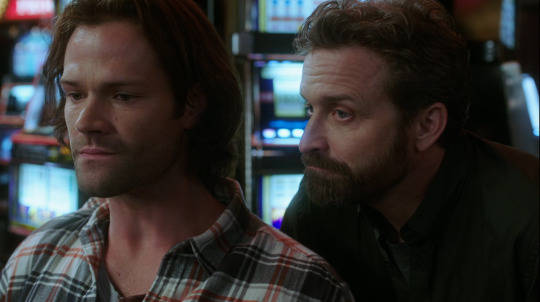


samchuck propaganda
#i do like how handsy he is with him. just like lucifer lmfao.#also i very much did appreciate that sam was the one who shot him and thus psychically linked them together#if i werent bone-tired rn i would do incoherent analysis abt that#and abt samchuck vs deanchuck. i think ive said this before but i can get behind chuck as a character if/when he's used to#metatextually comment on sam's treatment as a character vs dean's#there is the tiniest hint of that in s15 canon but you can sharpen it as a viewer#why do i feel like i have to do all the work myself here IDIUFHIUDHFUH#tag vomit#spn#15.09
63 notes
·
View notes
Text
I think what's really compelling about House's absolute unwillingness to bow down to anything or anyone (the ethical board, the law, extra rich CEO, vindictive police officer, and even the patients themselves) regardless of how absolutely batshit and downright illegal his actions are, is because it's coming from a chronically disabled person, in more ways than one.
He cannot walk without agony or his cane. His chronic and severe pain led him down the path of deep Vicodin addiction until he also becomes psychologically dependent on it too (once, Dr Cuddy gives him saline placebo and it "works", in that he is not feeling his leg pain anymore for a few hours).
He understands it deeply just how desperate people can be when they're in pain and nobody can (or are willing to) help them—at least, so far, until they land on his doorstep. Which is canonically the most extreme step patients take when everything else fails—you don't just go straight to Plainsborough Teaching Hospital and to Dr Gregory House MD's office; you have to go through dozens of other doctors in various specialties and failed treatments too.
(Although that's a separate discussion about how doctors, particularly resident ones, are overworked and underpaid and redtaped by shithead insurance companies even if they do know how to treat a patient and want to).
He knows, from the bottom of his heart, that having such a painful and life-limitting debilitating condition is comparable to hell on earth, because he has one. He knows, that despite his disability being visible to everyone, yet no one wants to put an effort to help him deal with it—is also hell on earth.
Cuddy simply throws money at him and turns the other way to his Vicodin abuse, like she is saying, "I don't care if he takes 10 Vicodin pills a day or more, and I have to pay at least $1M every year for lawsuits, as long as he gets the job done," (and when they decide to go into relationship, she immediately drops him when he relapses, even if the reason for his relapse is her—although, yes, there is another discussion to be had about keeping yourself and your child(ren) safe being a priority compared to helping an addict, recovering or not). Wilson, as loyal as he is to House, simply either enables him or lectures him without going into the root of the issue and thoroughly help House that way. His subordinates, especially after the original trio, are simply too scared, too ignorant, or too ambitious to even approach the issue and choose to keep their job than help House (also another discussion to be had about how you can't help people who don't want to help themselves and so on).
So when he sees a patient who has gone through hell trying to get a correct diagnosis and treatment, he becomes laser-focused on doing everything under the sun to get to the bottom of it and cure the patient. He doesn't care if he has to break into countless of houses (haha pun) and collect insane and probably biohazard samples to do it—he absolutely will, no question.
Yes, hate-criming and being a bigot is his favorite hobby (still livid at the asexual ep and the production's choice for the resolution, let's just say I still have beef with Hugh Laurie and the entire production team for it), and so is insulting patients in so many ways that Shakespeare would personally fly to New Jersey and shake his hands if someone manage to successfully perform necromancy on ol' Billy boy. But House is no one if not dedicated. "Yes, my patient is an idiot, everyone is an idiot too, but I WILL cure their condition like my life depends on it," is basically his middle name.
Besides, you can make the argument that he is more compassionate than all the other doctors around him, because despite his absolute disdain towards some of his patients' beliefs and stupidity, he still works his ass off to treat them. He will call your god an idiot in 7 different languages while putting you in a diagnostic machine he manipulated the whole hospital into letting him use so that you could get a test which weren't available to you before. He will tell you that your currently-happy marriage will end in a bloody divorce and your ex will leave you penniless so love is not real while injecting you with a medication he had to hack the CDC's database for.
There are even episodes that show him being truly earnest, like the clinic duty scene where he is snarky as usual to a girl who seemingly stupidly had unprotected sex until she lashes out, and House is like, "Oh shit, this is above my paygrade", and immediately goes to Cuddy with a very serious expression and no sarcastic dilly-daliying, demanding her to transfer the patient to someone else because he is not good with "curing" rape case (interesting choice on the writers' part to make the patient insist to have therapy with House, though).
There is an episode about a very workaholic woman executive in a fashion company who has tremor and partial paralysis, and later on it's shown that she seems to tie her worth as a person to her corporate success while band-aiding her deep psychological issue like her suicidal ideation, and House genuinely asks her, "Do you want to live? I cannot help you unless you want me to," or something along the line.
There is also the cursed 9-year-old terminal brain cancer episode where Chase kissed the patient (ew), where at first it shows House being a usual misanthophe to Wilson and saying, "She is not brave, it's the brain tumor clot talking because it must be near the amygdala." Later in the episode, House sits near the patient alone, and compassionately asks her if she even wants to live, going through the rest of her short-lived but horrible agony, even if they catch the clot. The surgery to find and get rid of the clot is risky and can debilitate her even more, and this is why House is laying the decision to her hands. That she gets to choose. This is what truly reveals to him that she is genuinely brave (aside from the scan showing the clot to be so far away from her amygdala), but for the wrong reason. She is brave for her mom, willing to go through horrible surgery and drag out her already painful cancer-ridden life because, "My mom needs me". When everyone is congratulating her in the end, you can tell House has a bittersweet expression of both awe towards her bravery, and sadness that this 9-year-old sick girl has to bear the brunt of her horrible pain just so that her mother is not sad. That he couldn't convince her to be a child until the nearing end of her life.
The most interesting evidence of his compassion to me is the gunman hostage episode. It might sound weird because in the whole episode, he is depicted to first want to outsmart the gunman patient, then becomes laser-focused but only because he sees it as a puzzle, then absolutely selfish and dangerous because he volunteers himself as the last hostage and gives the gun back to the guy after the MRI. I do think it's true that his dedication to solving patients-are-just-puzzle-to-me conditions shines through in the episode, especially the scene of him returning his gun, but there is something else I catch when I rewatched it before.
When the gunman patient is put in the MRI because Cameron tells him a theory through the hostage call, the remaining doctors in the room including House are wary at the gunman but also hopeful. Yet, when the result shows up on the screen, he realizes that the theory is wrong and the guy let go his only bargaining chip for nothing. If you watch this part carefully, you'll notice that House actually looks pitying and sad at the gunman's disappointed demeanor and expression. He realizes he is going to be another notch in the guy's failed doctors list, and at this point (with the gun given away and even the best, most talented doctor also not finding out what's wrong with him), the guy has given up hope that he will ever see the day he will be cured, certainly not behind the bars.
Yes, his thirst for puzzle is House's big driving force in giving back the gun, but you'll be lying to yourself if you don't notice House's compassion for the guy because he doesn't want the guy to go out empty-handed, with absolutely no more hope because House knows once they step out of the door, this guy will never, ever be allowed to be in the vicinity of any hospital or doctor ever again in his life, aside from jail's bare-minimum exams and medications. House can't handle the thought of putting someone else through his own disappointment—that nothing works to help his leg pain. He especially doesn't want to be the cause for this gunman guy's case either. Even in the end when House realizes the guy is a fucking moron because he doesn't know that Florida is, in fact, in earthwide-horizontal tropical zone and this is what stumps most of the guy's previous doctors—House still gives him a subtle salute to the guy while being handcuffed and led away, almost to say, "Enjoy your healing and the defeat of your arch nemesis The Sickness™, glad to be part of it."
Majority of his drive to stop at nothing until his patient is cured is definitely thanks to his own fucked-up leg, even if there are some dialogues with Cuddy and Stacy Warner (House's ex wife) that seem to imply he has always been a misanthrophe whose hobby is getting into malpractice (or general) lawsuits. I wholeheartedly believe that after his leg clot rendered him disabled and with chronic pain, he became much more dedicated and obsessed with getting to the bottom of a patient's medical information, even for info that seems innocuous or irrelevant that always turn out to be important (probably more like a plot armor than established characterization, to be honest), almost like this is his method of relating to the patients in his own weirdly human way, and maybe a little bit (actually, a lot) of projecting.
Thank you for coming to my TED Talk.
#house md#rec#media analysis#writing#english#me#i hv more to say abt this show like him making the mistake of not amputating his leg bc of his bias against (particularly visible)disabilit#even tho cuddy and his other past ortho surgeons suggest against keeping the leg because the clot is really bad and unsalvagable#years later even while having his leg it's now useless because all it gives him is pain and anger issue with a dash of opioid addiction#so when he sees patient being stupid or refusing a certain test/treatment he KNOWS in the bottom of his heart to be right#he just won't take it lying down & he will drag his patients kicking & screaming bc ''trust me i was an idiot too don't repeat my mistake''#but that's an essay for another day#whump#whump meta#disability
105 notes
·
View notes
Note
do you have any particular thoughts regarding marcille being a half-elf? its interesting to me considering the fact that she seems self-conscious about being a half-elf, but denies it when its brought up
i remember marcille looking visibly uncomfortable over laios simply asking her how old she is, which i think the only reason she might feel nervous about this is because it might reveal her as a half-elf to him.
she's never corrected anybody whose called her an elf either.
never mind the circumstances of the reveal, in which thistle goes on about how half-elves are inferior and accusing her of wanting to become full blooded elf, she seemed particularly upset like he struck a nerve-
i wish the half-elf thing was built upon more. also, underrated marcille line:
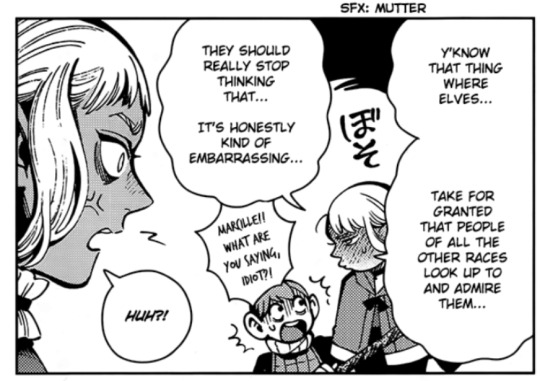
okay so i revisited this sequence just to make sure I could back myself up and it's just... man. there's a lot going on.
the first reaction we get from Marcille is this huge panel that takes up half of the page
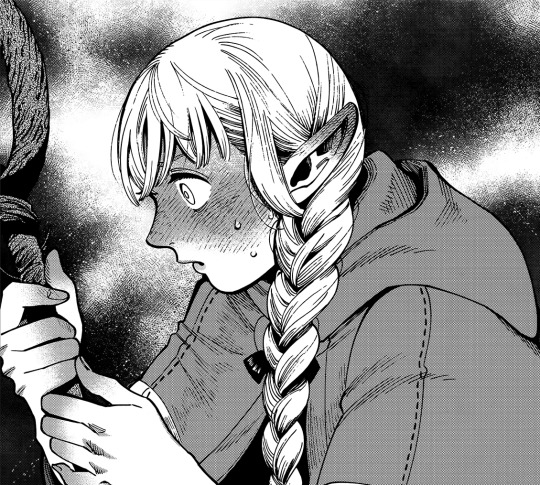
she is viscerally affected. flushing to the tips of her ears with the intensity of it. and we see it again, a few pages later
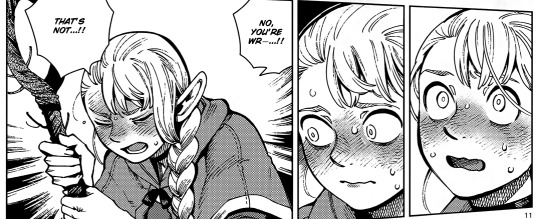
so it might seem like she's embarrassed about it and lying to herself, but... I really think it's just that Thistle is accidentally hitting sore spots. If you really look at what he says to get these reactions
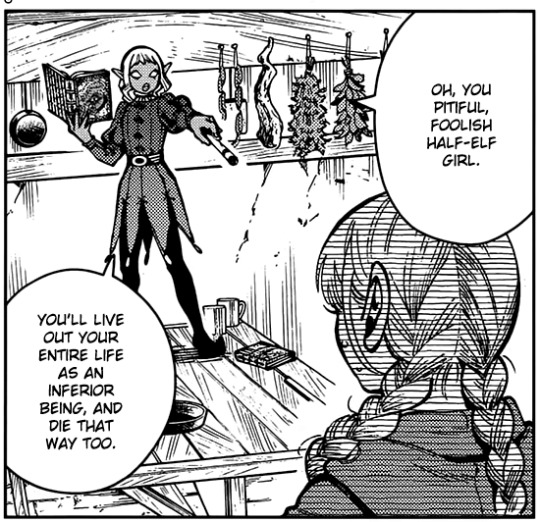
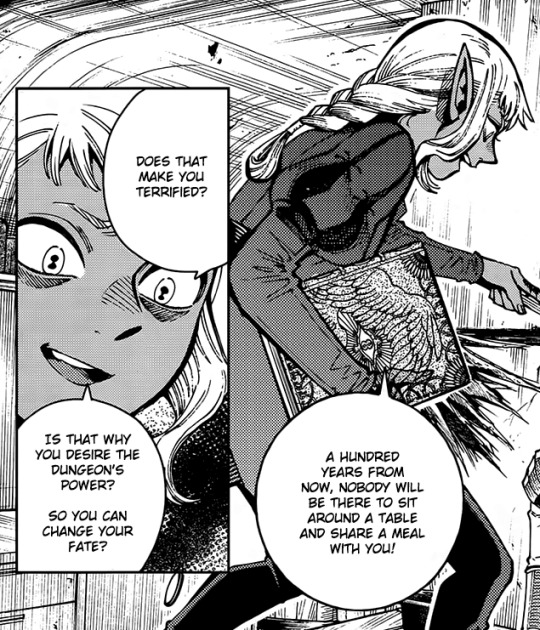
"you'll live out your entire life [...] and die that way too"
"a hundred years from now, nobody will be there"
Hear me out. I think, if he stuck to harping on about her inferiority without bringing up how terrifyingly long-lived she is, she wouldn't have been as bothered. But right now, Thistle is accidentally hitting all the marks on Marcille's deepest fears-- and this is after the Winged Lion promised her that her dreams could come true in an extremely vulnerable moment, so it also hits her slightly guilty conscience as well.
I do truly believe that Marcille isn't bothered about being a half-elf the way that people assume she'd be bothered by it. To her, the biggest problem with being a half-elf is that it's isolating.
On one hand, it's not hard to imagine why she'd distance herself from elves in the west. A lot of them can clock her as a half-elf on sight, unlike other races, and therefore she's always branded with this weird stigma of being Othered -- I would even say that she considers herself lucky for being born outside of elven culture instead of having to grow up in it. I mean, just... look at the way elves talk about her.
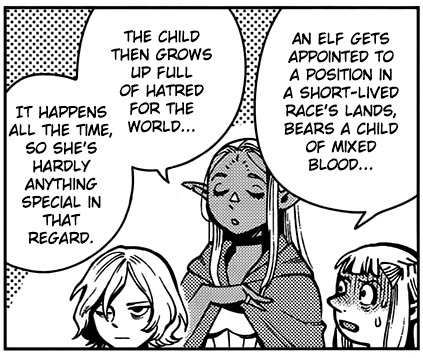

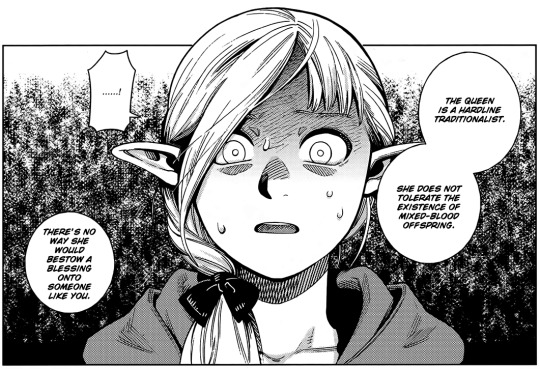
Skipping past the uncomfortable implication of what 'not tolerating the existence' of half-elves would actually entail, this is incredibly fucking annoying. You can see why she wouldn't want to be around elves much. You see a lot of Marcille reacting badly here, but honestly, almost all of it can be attributed to her freaking out that her bluff completely failed. She's honestly more paying attention to Izutsumi's footsteps and trying to coordinate an opportunity to escape.
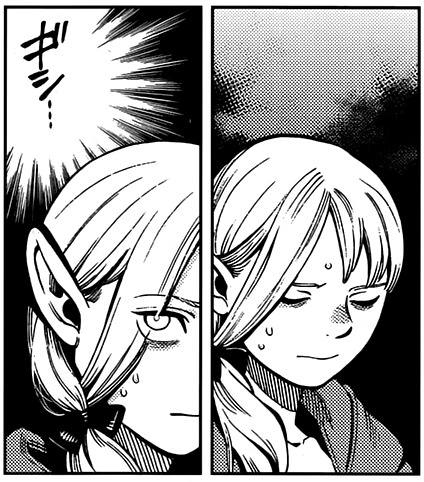
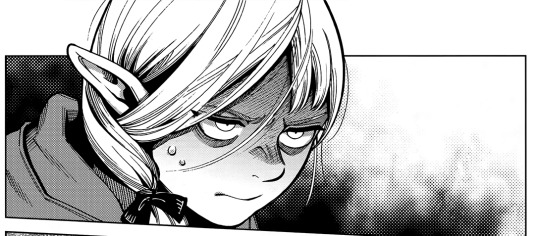
And in the end, you see her built-up frustration at being asked if she wants to be a full-blooded elf like 2-3 times in a row.
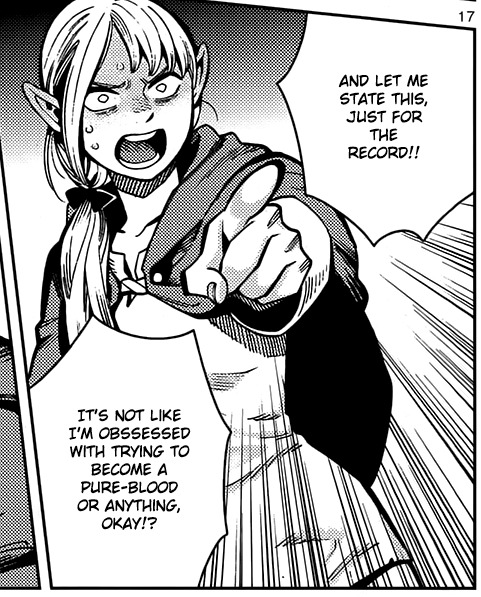
Yeah, yeah, "the lady doth protest too much," and all. But we know Marcille. We know that she's a lot more embarrassed and horrendously unconvincing when she's being prodded about something she's actually self-conscious about.
Moving onto the flipside of things, it might seem weird that she "pretends" to be a full elf around other races, but it's not really that strange if you think about it. Again, people are weird about her being infertile or whatever, and a lots of them don't even know much about what sets half-elves apart from everyone else. I mean, look at how uncomfortable Laios is just asking her about it
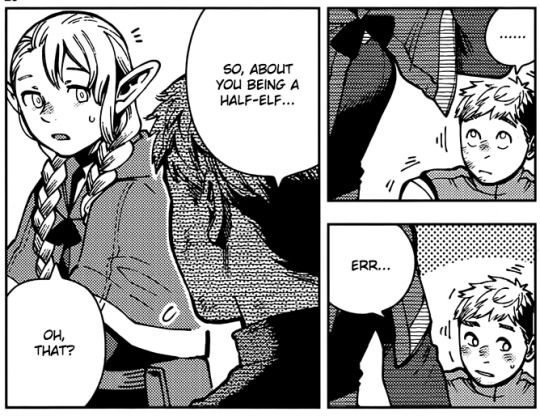
and look at how exasperated and resigned she looks
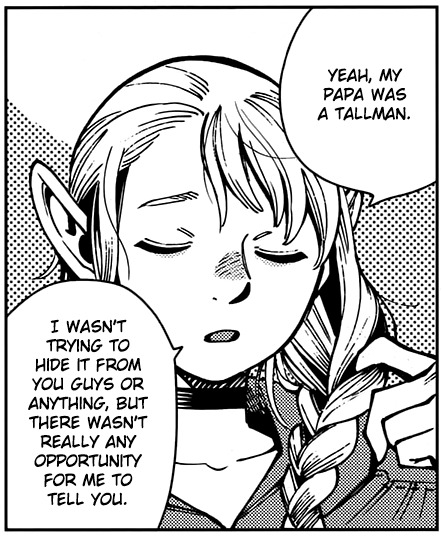
And like... she's right. Where would that come up in normal conversation? Why would she go out of her way to tell them? She's functionally a normal elf to other races anyway -- got the ears, the abnormally long "childhood", and the huge mana capacity. Unless it's directly relevant or important for people to know, I don't think it's all that strange or indicative of insecurity that she prefers not to bother with it.
(This combined with her sense of being an "outsider" to elf culture also explains why she thinks elf superiority is embarrassing. She sees the way elves treat short-lived races from the "outsider" perspective nonetheless, and thinks it's obnoxious; especially more so because she usually has to play the elf around short-lived races and deal with the reputation of arrogance that elves have built up.)
The sad thing is, this all means that... she doesn't actually fit in anywhere. She doesn't like going out West much because of how elves treat her. But she's also an outsider in the continents she was born in, treated like this exotic long-lived alien choosing to live among short-lived races for some reason. She is always an outsider, the Other, no matter where she goes. Add in the fact that she'll live longer than literally anyone she knows, and it's honestly kind of heartbreaking.
And I think that's the crux of it. Marcille really doesn't act like she's at all self-conscious about being a half-elf because of any feelings of inferiority or being half-made or whatever. She considers herself a perfectly legitimate being and might even, in some ways, consider herself superior to normal elves because she's not blind with elf supremacy or whatever. (And whatever "elven biases" she displays, all of them are born more out of the fact that she's kind of bad at conceptualizing how other races age and mature compared to herself, not that she actually considers herself better or more mature simply for being an elf.)
I think that whatever self-consciousness Marcille has about being a half-elf is, instead, related to terror and loneliness. The reminder that it ensures she'll never truly belong anywhere for the rest of her very long life. The reminder that, in truth, even she's not actually sure how old she is by other races' standards (hence the discomfort when asked how old she is). She doesn't want to not be a half elf, or be a full elf or full tall-man-- in her ideal world, she's still a half-elf. She just gets to live out her life at the same pace with the people she loves and doesn't have to say goodbye again and again and again until she dies.
and one last very important panel, right after Mithrun tells her that all her desires would be devoured
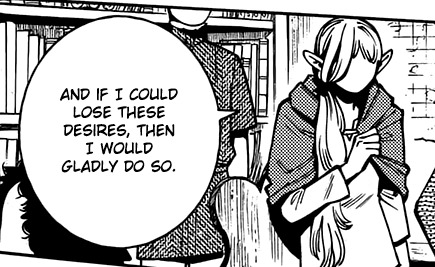
In her ideal world, she's still a half-elf and reality magically starts marching at her pace. But failing that, the second best thing is that she's still a half-elf-- but one who is able to accept reality and let go of her fear.
(But the rest of the story pans out the way it does because, to Marcille, taking reality apart and reshaping it was less scary than simply and fully reconciling with it.)
#asks#dungeon meshi manga spoilers#marcille donato#manga panel analysis#this is probably riddled with typos sorry#readmore cut bc it got long lmao#i ended up babbling about it bc it's such an important character detail to me#bc like... wow. she's so normal about it. she's literally just chilling.#the only thing that really bothers her is the material reality of it and how people treat her#the stereotypes the stigma etc. etc.#otherwise it just..#literally doesn't factor into her criteria for self-worth at all#the basic truth is that marcille likes herself on a fundamental level#she's not plagued by a deep and festering self-loathing the way a lot of characters in her archetype are#she likes herself and is proud of her successes and accomplishments#its just that shes terrified of failure and can have *episodes* of self-loathing when she fucks up#but who doesn't yknow#i know its a very slight nuance that makes very little difference in how her 'overachiever' problems manifest but its there#the sword of abandonment issues that hangs over her head has nothing to do with her self-worth or self-esteem or meeting her own standards#it has to do with the fear of not living up to *other* people's expectations and not being useful enough to be worth keeping around#she's good enough for herself but she's always so so so scared that she's not good enough for other people#i wont say much about what ryoko kui is saying using this as an allegory for real world racial biases but#dungeon meshi's treatment of marcille's relationship with her being half-elf is so incredibly important to me because it gets it so right.#a trauma about inferiority or being a half-being isn't inherent to the experience of being 'of two worlds' at all#that's something that's unfairly drilled into people by their environment#the *inherent* anguish is the loneliness. the constant longing. the fact that you are always homesick no matter where you are#always just a little bit of an outsider and never fully at home#and dungeon meshi gets that.#edit: cleaned it up a little
117 notes
·
View notes
Text
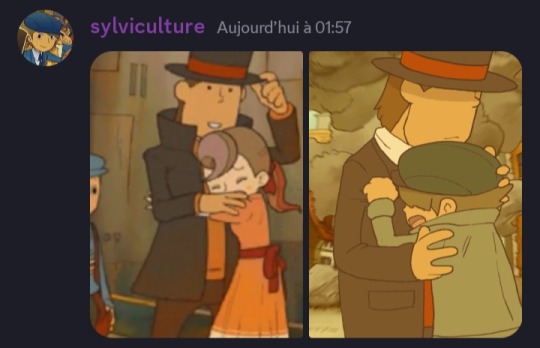
Oopsie daisy
#Please don't pay attention to my pseudo or to the time <3 I'm doing great#Do pay attention to the parallels and the trauma tho !! It'd be a shame to miss this D:#So yeah. I was uploading screenshots to Discord and this happened. I'm sure I could/should write an analysis here !!#But I don't have one on hand so I'll just say that I put Flora through the Clive treatment in one fic <3 Flora I love you I swear#clive dove#flora reinhold#hershel layton#professor layton and the unwound future#professor layton and the lost future#unwound future spoilers#lost future spoilers
101 notes
·
View notes
Text
Okay now that I'm caught up (anime only) I can say with full understanding that I don't get the Toshiro(Shuro) hate. Like come on, the guy is flawed in his own (totally rooted in his culture and upbringing) way, just like literally every other character here. What.
#dungeon meshi spoilers#I suppose#like okay the 'uno reverse' jokes about him getting a female character in a way of a mlm ship treatment are kinda funny#and sure I get it a lot of us are defensive about the whole 'autistic character gets yelled at for not reading the room' thingy#but none of that warrants some of the shit that I've been seeing???#how's that worse that what Marcille and Chilchuck have been doing to Laios the whole time prior?#'oh he courts Falin but isn't ready to do atrocities for her' well first of all as Kabru correctly called him out - he would be.#second of all that's a point worthy of a character analysis at best#not the HATE#sorry I just was kinda curious what the fuss was about and like?#the guy shows up for ONE episode (so far. idk what happens in manga yet) and mellows out by the end of it#and y'all are writing thinkpieces on how he ultimately sucks? maaan#I don't even care that much but UUUUUGH
30 notes
·
View notes
Note
i know for sure if Dawnpelt was a tom everyone would want her dead and no one would bat an eye, but bc she is a lil messy girl it's 'mean spirited' and 'too intense'? okay lmao 👍
HUH??
#i think this is a good point to stop responding to asks about the dawnpelt situation!!!!#theres a response from the og anon clarifying what they meant which i'll be putting in the replies of the original post#and a really lovely character analysis i'll definitely be responding to#i dont want to clog up my blog too much with these asks so i'll stop responding to asks until after i post the next moon#if anyone wants to disagree with this person you can do so in the replies#chitchat#ask#for the record. i disagree with anon. first of all i think people generally think dawnpelt is being an ass. no one is defending her actions#secondly i think people are historically way harsher on female characters in media#for example think of ashfur's treatment by fans+authors compared to squilf's or dovewing or even canon dawnpelt
49 notes
·
View notes
Text
Belos, and the way he purposely appealed to The Collector: A TOH ANALYSIS.
I feel like one of the reasons that The Collector trusted Belos so much, was because he literally made himself appealing to them.
Despite the few scenes that they have, you can probably name a few of the aspects he changed around them. But one of the most apparent ones for me, was how Belos basically changed the way he spoke around them.
In a lot of the moments where they appeared together, he seemed to use a much more softer & sing-songy voice around them, as well as more simpler and 'friendlier' language. It's not even just with The Collector, through-out multiple times in the series he's changed his behaviour around individual people.
To name an example, let's start off with their initial meeting. Although Philip/Belos was speaking in an already soft tone of voice towards Luz and Lilith in Elsewhere and Elsewhen, it was much more calmer and monotone.
"Thank you for your kindness, crab maiden. Perhaps we were destined to meet."
Despite the obvious compliment, his words almost feel empty. There's no feeling of "thankfulness" behind them, just a pat to the shoulder and that's it. But that's the thing, even Lilith said it in the same scene. He just says everything a person wants to hear, and to Luz, just hearing his 'gratitude' through a sentence was enough to make her feel nice for assisting him so kindly.
However, when you look at when two of his scenes with the Collector, you can see Philip's shift in tone and behaviour.
Although he still had an almost blank expression, the very first thing he said when he unburied their plate and held it up was an almost playful, but simple "Found you", literally singing it out, around the end.
I feel like this is due to the fact that, Philip definitely knew The Collector was a child and made that subconcious switch in his words while speaking for them. It was made way more apparent when he was talking to their tablet and calling them these (objectively) silly names, at the same time looking endeared while speaking. Philip's face almost lit up as they called them 'a round boy'.
Like Lilith said, to Philip, he immediately started to speak like how you'd typically do with a child. Much more playful wording, and friendlier mannerisms even.
Although I believe at the start of their relationship that Belos treated The Collector more kindly to have them warm up to him, even later on you can still see this happening.
In the memory of Belos & The Collector in Hollow Mind, it's even more obvious than my previous examples. Belos & The Collector are quite literally playing a game, in this case Hide & Seek, with Belos being the one to start the whole interaction.
And again, when he's calling out for The Collector at the start he's using that playful, but gentle sing-songy voice. He's going along with their little game, because he's been doing this for *decades* now. Exactly what I mean when I say Belos appeals to them, he's giving into their childish nature and feeding onto it.
Likewise with his language, Belos changes it to make things sound more engaging to them. Although The Collector knew what was happening with the Day of Unity, with the way Belos was framing it, it was inevitable that they would just treat it so unseriously.
Ex: "You'll have your fun, on the Day of Unity" Like? Even though The Collector didn't even understand the concept of death, it was clear that they weren't fond of people just disappearing, like the titans. But Belos was literally treating the death of millions of witches like some fun game of hopscotch. Add that to the list of manipulation points!
Another example? Grimmwalkers.
The Collector was seen to view them as 'things', toys that he saw Belos just get rid of time and time again. And with the way he was framing it as them 'betraying' him, Collector probably just began to believe that and started viewing them like he did.
I think I delved into a completely different point with this scene, but long story short, Belos additionally uses his change of tone and language to further desensitize horrific situations to them. I would say even sugarcoat them in a way.
During King's tide, there's this one scene where King sees The Collector, and Belos is reassuring him. This one is a bit more different than the other scenes. Unlike the previous scenes I've talked about, instead of The Collector just acting playfully and seeming to trust Belos with what he says, they're actively doubting and complaining to him. And what does this come off as to Belos? A cranky child.
And like anyone dealing with a cranky child, he immediately deals with the situation as 'best as he can'.
First, he reassures and shuts down their doubts about being freed, telling them that it was *specifically* AFTER the draining spell that they'd be freed. And when The Collector doubted him once again, he essentially frames it as the child being the one in the 'wrong' here. They just have the be patient to get their reward after all, don't they? It's sorta like how a parent just tells their kid that "Oh, we'll be there soon, just wait!". Except that The Collector instead of waiting, will literally never get freed.
Basically, Belos is quite literally gaslighting them, in the sense that he's making them feel like they're acting out of order for a very reasonable doubt.
Additionally, he's also making them FEEL like an impatient with the way he's speaking and wording himself. Belos is portraying the whole thing as this being unfortunate for the both of them ('WE have to way for after the draining spell . . .'), and tell them to just have 'patience'.
In a fucked up way, this is probably how Belos disciplined them.
And this leads me to my next point. Like some sort of system of rewards and punishment, whenever The Collector was shown to actively say things that Belos didn't like, even if it was just for the moment, he altered the way he behaved and talked around the kid.
During Clouds in The Horizon, you can immediately notice the difference during the scene with these two. Even if there was the chance that Belos was already in a bad mood, and The Collector who was just making crude jokes for half of the time worsened everything, and there's a notable change in his wording and behavior. Belos is much more withdrawn, not even responding to the boys comments at certain times and giving them the silent treatment
Something I noticed even as I write this, was that in a sense this scene and the one from Hollow Mind parellel almost perfectly.
In Hollow Mind, when The Collector was joking about Belos lashing out at Hunter and turning into his monster form, Belos pretty much brushed it off and just took it as a chance to go "well, as long as he doesn't fuck around and find out, he'll be fine". Even when they were literally saying that the grimmwalkers were 'things', a mind that Belos just made them to torture them, the guy literally SMILED as if he was amused.
Meanwhile, Belos had a completely different reaction to practically the same comments, but in a different font.
Now, The Collector was making fun of him for his monster form, saying how he can't even keep it up anymore. In response, Belos just proceeds go punch the wall and just prove their point. As for the grimmwalkers, when they suggested that the man should make another one go play with, he just shut down them said they needed to 'deal' with this one.
There's a very clear difference here: In one scene, The Collector isn't directly mocking Belos, and the man is amused by their honestly horrific joking about such vile situations. In another, they're using those same situation and topics to make fun of Belos.
In short, Belos only seemed to excuse these comments when they weren't directly being negative towards *him*, and almost rewarded The Collector by continuing to speak to them in a friendly manner. Once they did, he almost retracted a 'priviledge'.
Because that's essentially what it was. A privilege that Belos gave them by just treating as 'nicely' as someone like him could get. And like any child too, they were blinded by it.
Again, bringing me into my next point.
When Belos betrayed The Collectoe, it was the exact moment when that privilege and everything else, was permanently revoked. At first you can see how Belos just watches as The Collector, like expected, excitedly talks and gushing about how they'll be able to play. Even after all these years, Belos really is freeing them. And they'll be able to play now!
Except they aren't.
Because immediately after, Belos shut down any hopes that they have of being freed with a simple "I'm afraid that's impossible".
At first, they're confused, hurriedly repeating Philip's promise, because sufely he couldn't have forgotten about it. But the man just brushes it off as an inconvenience, that he just didn't have any more Titan's Blood to free them.
And even as The Collector shouts and screams that Belos was a liar, unlike in the scene where he reassured them about their doubts, he doesn't have to do that anymore. Because there's no use in appealing to them anymore.
The kid was wringed dry of all their use to the man. And just like those grimmwalkers, like those witches, like everyone, Belos would leave them. Because in the end, they were also just a 'thing' for Belos.
And to add more insult to injury, it's not even like Belos just started acting all serious and mad like whenever he was upset with them. Opposite, even, because there was still using that sing-songy, playful tone to his voice speaking to them. In a sense, it was now The Collector's turn to be mocked. And it's not even like they could protest and throw one of their 'tantrum's', because Belos essentially just shut them up.
After dropping their plate down a bridge, just to add to open up that cut even more, Belos simply parted ways with them with a GOODBYE. Not even calling them by their name, giving them one last display of 'affection', or perhaps thanking them for their 'help' to Belos. Just a truly emotionless goodbye.
And, BELOS JUST WALKED AWAY AFTER THAT. Because truly, those decades meant nothing to him. The way he so eloquently phrashed and sang out everything to flatter the kid, going along with their silly games, and reassuring them– that was in the past now.
But here's the thing with that man. HE LITERALLY CANNOT STAY CONSISTENT. Belos cannot fucking commit to, and accept that his actions have consequences, because it was obvious he immediately regretted disregarding the kid once they were freed.
As my final point, let's take a lot at the infamous "splatter" scene.
You can literally see how Belos stepped away out of fear. Because unlike the shadow boy that just lived in his basement, that could only move around his walls at most, The Collector was now freed. And what does that mean? It means that Belos fucked up BIG time. Literally as they turn to look at him, that blank look on their face told that man everything he had to know.
And of course, he immediately retracts on literally every he said before, and begins trying to appeal to the kid by twisting around his intentions.
Belos was probably just hoping they'd be gaslighted enough to just run back into his arms and accept his words, but at that moment they weren't fooled like before. The Collector knew his true intentions, and no amount of sing-songy voices and empty compliments could change that.
This analysis is quite literally getting too long LOL, it was supposed to be super short. I was planning to also analyze the Raine scenes, and compare the scenes included to seperate belos scenes, but I'll end it on a short note.
TLDR; Belos purposely changed his tone of voice, language and overall behavior to appeal to The Collector. Essentially to manipulate, desensitize and gaslight the boy to a lot of horrific things. Even then, it backfired on him in the end.
#the owl house#toh#the collector#emperor belos#philip wittebane#belos toh#collector toh#philip toh#toh analysis#long analysis#the owl house analysis#character study#oh my god this is so messy#originally i was gonna include the scenes i was talking about but. yknow.#only 1 video per post#dear god as i was writing this i kept discovering more and more points for thi#i cut out so much because this would get too long#jesus Christ now that i look at it#belos treatment of the collector was HORRIFIC.#Like.#actually fucking horrific#i proved my belos and collector father/son point but. at what cost.
52 notes
·
View notes
Text
Revolutionizing the Ovarian Cancer Market: Strategies for Success | DLI
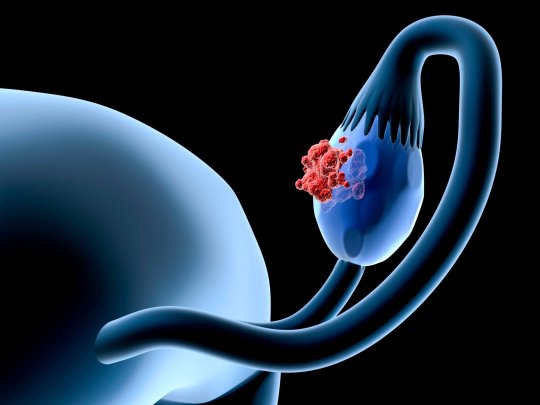
Ovarian Cancer Overview:
Ovarian Cancer is a formidable health challenge affecting women globally. It is characterized by the abnormal growth of cells in the ovaries, which are vital components of the female reproductive system. Often diagnosed at an advanced stage, ovarian cancer poses significant clinical and therapeutic complexities.
Ovarian cancer silently appears as a powerful foe that demands undivided attention. It is unyielding and resilient. It affects women of all ages and socioeconomic backgrounds and spares no one. This sneaky illness hides its presence, frequently coming to light only when the fight grows more difficult.
The Market Competitors Listed Below are Revolutionizing Healthcare with Innovative Diagnostic Inventions:
Price & Market Access
Diagnostic Analysis:
Early Detection Challenges:
Early diagnosis of ovarian cancer remains a critical issue due to its asymptomatic nature in the initial stages. Lack of specific symptoms and effective screening tools makes timely detection a formidable task.
Screening Methods:
Currently, screening methods primarily include pelvic examinations, transvaginal ultrasounds, and blood tests measuring CA-125 levels. However, these methods often lack the sensitivity and specificity needed for reliable early detection.
Treatment Analysis:
Standard Treatment Modalities:
Treatment approaches for ovarian cancer encompass a multidisciplinary approach, including surgery, chemotherapy, radiation therapy, and targeted therapy. The extent of surgical intervention and choice of chemotherapeutic agents are determined by factors like stage, histology, and patient's overall health.
Emerging Therapies:
Immunotherapy and personalized medicine are emerging as promising avenues in ovarian cancer treatment. These approaches aim to enhance the body's natural immune response and tailor treatments based on the genetic profile of the tumor.
Regulatory Framework:
FDA and EMA Guidelines:
Regulatory bodies like the FDA (Food and Drug Administration) in the United States and EMA (European Medicines Agency) in Europe play a pivotal role in approving and regulating treatments for ovarian cancer. Rigorous clinical trials and safety assessments are mandatory before a therapy can be marketed.
Therapeutics:
Targeted Therapies:
Targeted therapies like PARP inhibitors and angiogenesis inhibitors have shown promise in treating specific types of ovarian cancer. They work by interfering with the specific molecular pathways that cancer cells rely on for growth.
Immunotherapies:
Immunotherapies, including checkpoint inhibitors, are being investigated for their potential to enhance the body's immune system to recognize and attack ovarian cancer cells.
Diagnostic Techniques:
Genomic Profiling:
Advancements in genomic profiling have revolutionized the understanding of ovarian cancer. DNA sequencing and molecular profiling enable a more precise characterization of the tumor, guiding treatment decisions.
Liquid Biopsies:
Liquid biopsies, analyzing blood or other bodily fluids, offer a non-invasive method to monitor tumor genetics and detect minimal residual disease.
Treatment Techniques:
Minimally Invasive Surgery:
Minimally invasive techniques, such as laparoscopy, have gained prominence in ovarian cancer surgery. They offer shorter recovery times and reduced post-operative complications.
Hyperthermic Intraperitoneal Chemotherapy (HIPEC):
HIPEC is an innovative technique that delivers heated chemotherapy directly to the abdominal cavity during surgery. This approach targets residual cancer cells and has shown promise in improving survival rates.
Browse More Information:
Clinical Assessment:
Multidisciplinary Teams:
Ovarian cancer treatment requires collaboration among various specialists, including gynecologic oncologists, surgeons, medical oncologists, and radiologists, to create personalized treatment plans.
Survivorship Care:
Long-term survivorship care plans are essential to address the physical, emotional, and psychological aspects of recovery after ovarian cancer treatment.
Expanding Therapeutic Landscape:
The ovarian cancer therapeutics market is witnessing a surge in research and development efforts, with a growing number of targeted and immunotherapeutic agents in the pipeline.
Regional Research Initiatives:
Different regions are contributing to ovarian cancer research with unique perspectives and approaches, fostering a global network of knowledge-sharing and collaboration.
Conclusion:
Ovarian cancer poses significant clinical challenges, but with advances in diagnostics, treatment modalities, and regulatory frameworks, there is hope for improved outcomes and a brighter future for those affected by this disease.
Browse Through More Oncology Diseases Research Reports.
Related Reports:
Diverticulitis: A Complete Guide to the Symptoms, Causes, and Treatments
When it comes to strategic Diabetes Disease consultancy, some of the areas we assist you understand include Regulatory Insights, Disease Landscape, and Market Access Expertise.
Find treatments for HPV illness using specialized market entry strategies. FDA/EMA insights and clinical trial advice. Examine right away!
Learn about specific approaches to Pancreatic Cancer Disease market access, pricing, and reimbursement. Learn about market research and clinical trials. Change your business immediately.
Learn about KOLs, the FDA, epidemiology, price reimbursement, and more in this market report on Anemia Disease. Your trustworthy source for info on anemia. Examine right away!
#clinical assessment#diagnostic analysis#market trends analysis#regnal insights#treatment analysis#disease#lung cancer#branding#economics#editorial design
1 note
·
View note
Text
I have to be honest with you guys I immediately stopped caring about the junior year finale like the day after I watched it. I'm existing in a world in my head where the Rat Grinders r interesting and well developed. Canon can't hurt me anymore I am on a different plane entirely
#i almost never do this i am usually someone who roots all my analysis and engagement with canon but smth about the rat grinders#theyve taken over my brain but their canon treatment is so bad. so to the headcanon mind palace we go!#d20#the rat grinders#d20 crit
19 notes
·
View notes
Text
okay the way the fandom draws hobie brown is such an interesting indication into the way subconscious racial stereotypes play into characterization and it's,,,it's just interesting.
now, i spend A Lot of time in this fandom. and something i've noticed a lot of is hobie brown being drawn HUGE. like, they're making mans into a TANK. and he's just,,,not that??
like yeah, he has broad shoulders, and he's tall, but that's literally just most any black teen boy let's be honest. if you look at his actual canonical character design, he is LANKY. and yet everyone is drawing him super buff. now at first i didn't think much of it--people like buff men, and fanartists are always gonna take some liberties (honestly, i love when they put their special little twists on the characters). but as i saw it more and more, it bothered me more and more and felt a lot more indicative of some underlying biases within the fandom.
hobie being mischaracterized and stereotyped isn't shocking or new, but that mischaracterization leaking into physical depictions of him is! not to get too deep into it, but throughout american history*, black men have not been able to protect their loved ones in any way other than physical thanks to slavery and horrid mistreatment within an inherently racist system. thus gave birth to the trope of the big, aggressive black man who solves his problems with his twists. and after that, the big aggressive black man who is actually a sweetheart on the inside, but just has raging anger issues (and probably an abusive father as well).
*im aware that movie!hobie is not american and that not the entire fandom is either, but seeing as a large chunk of it is, and are going to be viewing hobie through an american lense, i think this is an appropriate connection to make. also, african slavery was very much a thing outside of america as well. also ALSO, the rest of the worlds perception of black men is affected by american (and english) views just because of how huge the two countries are within the global landscape.
now, the reason this was even bothering me at all in the first place is because when i first watched the movie, the fact that hobie wasn't overly muscular was super novel to me. i was glad that we got to see a black male character who was strong without taking strength from others, loud without obnoxiously talking over others, violent without being aggressive, assertive without being framed as forgetting this place or naive about the world. in terms of personal experience, it pisses me just that bit more than the last time whenever i hear my father insist to my (very sensitive and emotional) brother that the proper way to deal with any and every problem was by fighting. i was glad my brother (severely lacking in good black male role models) got to see this cool guy, someone you're meant to look up to, who is strong without being ripped and punching all of his problems. that black masculinity is more than how well you can fight.
so, the way a lot of the fandom forces hobie into this box, this preconceived idea of what a black man (or boy, more like, but the erasure of childhood from black kids is a topic all its own) should be, just. sits wrong.
#i have these kind of analytical thoughts about fanart depictions concerning all of the main four btw#so tell me if you wanna see me ramble about why miles doesnt get this same treatment despite also being a black boy#or why pavitr is chronically de-buffed (its not *just* cause hes asian)#when az rambles#across the spiderverse#spiderman atsv#atsv#hobie brown#hobie brown analysis#atsv analysis#fandom analysis
104 notes
·
View notes
Text
i dont think im done talking abt this, actually. i'm going to try and explain how stupid this whole thing is because there's always SOMEONE going on about how if it wasn't for the circles, and the parallels of the circles to real-life atrocities, "the mage-templar debate" would be a two-sided issue.
actually, it's not.
the "mage-templar debate" is not an issue of ethics even before addressing the conditions of the circle, because you have other options.
the basic premise of the argument is "mages are inherently a danger to themselves and everyone around them. is locking them up to reduce the harm they pose to the general population the correct ethical decision?" but the entire concept is already bullshit even before you address the conditions of the circle, which is where most people claim the civil rights movement comparisons come from.
because. CANONICALLY. you have other options. you have options within the context of the games to reduce the "threat" or "danger" of magic. there's no cases of mass abominations in rivain. there's no cases of mass abominations (as we know understand & abominations anyway) amongst the avvar. there's no cases of mass abominations in tevinter. from the get-go the idea that "mages have to be locked up for their and everyone's safety" is already bullshit, before you even touch the issue of the circles. even before you get to the conditions of the circle, the very existence of mages in rivain and nevarra and the avvar and tevinter already renders the argument null and void.
from it's very inception, the entire premise -- mages are inherently a danger to themselves and everyone around them -- is proven to be a belief, not a fact.
#if you wanna argue rivain and the avvar or whatever are dai-canon additions. tevinter has existed LITERALLY since fucking.#stolen throne. like please shut up lmaooooo#from the get-go it was clear that the belief that mages are inherently dangerous is bullshit#and LATER it got two-sides'd. it was ALWAYS a civil rights issue in the context of the game from the get go#COMPARABLE to the issue of civil rights of elves in the game#dao never fucking shied away from the incisive analysis#da2's narrative structure FORCED a two-sidesing bc of the nature of hawke's role as the protagonist#and dai was just imperialist apologist nonsense#and giving the mages ‟dangerous magical powers‟ to ‟justify‟ their treatment in-game is literally just bioware going ''what if there was a#of oppressed people (oppressed based on a set of erroneous beliefs) but the bigots were RIGHT''#AND YOU'RE JUST GOING ALONG WITH IT???#it's not the hot take you think it is lmaoooo#dragon age#my da meta#anti chantry
323 notes
·
View notes
Text
Sorry (not) but I find anyone who acts like Blue is making something out of nothing when she’s mad Adam’s first question is about the kissing to be like. Deeply suspicious. Of course she is mad that’s the first thing he asked her! They’ve been walking on eggshells around each other and not really communicating since the last aborted kiss attempt which is on both of them to some degree, but when he comes around to her it’s only for this and when she has so many fears and insecurities about not properly belonging in the gang because she’s a girl (which is founded based on the fact aside from Noah they’ve all been misogynistic towards her at some point even if it was passive) and not being respected, when she’s also an outsider at home because of a different thing she can’t control. And you can not say that her feeling Adam is treating her like a thing to have and not a person he connects with is unfounded he again literally “I got Blue without you!” screamed at Gansey, consistently going to her after they fight (he did it end of TRB after repugnant too) to validate himself or just generally when he’s falling apart looking for validation from her like in the apartment scene. It’s not a bad thing to seek validation from your partner and in TRB before I’d say the last quarter I think Blue and Adam were genuinely connecting and developing a friendship while also exploring their feelings/attractions to each other, which did always have elements of seeking escape or validation for both of them in different ways, but it’s dissolved into that so much now. And I do think Blue is to some degree mad at Adam because he’s here and available to be mad at when she’s also mad at Gansey for it (I don’t think they’re *in the wrong * for not inviting her but they are in the wrong for not even considering she could want to go or at least want to be in the loop, also even though it’s Gansey’s party if Adam is trying to be her *boyfriend* it was kind of his place to ask her) so she’s conveying anger at Adam when the anger is for both of them, and also more general factors she’s frustrated by, but also Adam has the exact same response of channeling emotions that aren’t solely about Blue through their fights (and to his credit he is self aware that he does this) so again crucifying Blue for it is whack imo. Also to check myself on shipper-brain for the Adam-Gansey aspect of it, well obviously I read that here as a factor because I’m me, but for arguments sake on the premise Adam has No feelings about Gansey that are anything other than platonic Blue would still have a right to be mad about him prioritizing his platonic male friends over her and treating them with more respect, obviously, because misogyny exists (also these are not two contradictory readings in that I think they’re both factors. Signed an Adam Stan).
#Also the fact we learn here he hasn’t ever been to her room when they’ve been sort of dating for a bit..#like yes Adam has much more going on at all times so you could say it’s only about practicality but. Practicality does Not stop Adam when i#comes to spending time with Gansey and even in a sense Ronan in the same way and she’s right to call that out#and she’s also right he wouldn’t talk to Ronan in this way. just wrong about the reason because he does also want to kiss Ronan#just they have a different dynamic. you could read social class and gender as factors I think for sure#(just in case I get annoying anons for saying that I’m not talking in terms of Adam’s sexuality in that obviously he’s bi and into men and#women. but he does relate to them differently and I think analysis of Bluedam that doesn’t acknowledge that is a bit unserious)#and I don’t think Gansey is better about respecting women than Adam to be clear he’s really not.#but much in the way that Ronan and Gansey both have classist moments but Ronan’s seems to be more .. tolerable is the wrong word. But it#doesn’t manifest in ways that hurt Adam in the same ways it does when it’s Gansey. I think Gansey’s treatment isn’t harmful to Blue the way#Adam’s is. For reasons that are more about Adam and Blue and what relationships and treatment work for them rather than objectively tallyin#who is better or worse in terms of isms#but I would need separate posts to talk about that#s speaks#s rereads the dream thieves#trc reread notes#trc#hmm how do I tag these. I think I’ll just go for char tags and leave everything else#blue sargent#adam parrish#my meta#social class / internalized classism is obviously a big factor for both Adam and Blue and how they see each other and the other boys but#that feels more obvious and less like something anyone would take issue with me saying so I focused on it less although it’s very much ther
19 notes
·
View notes